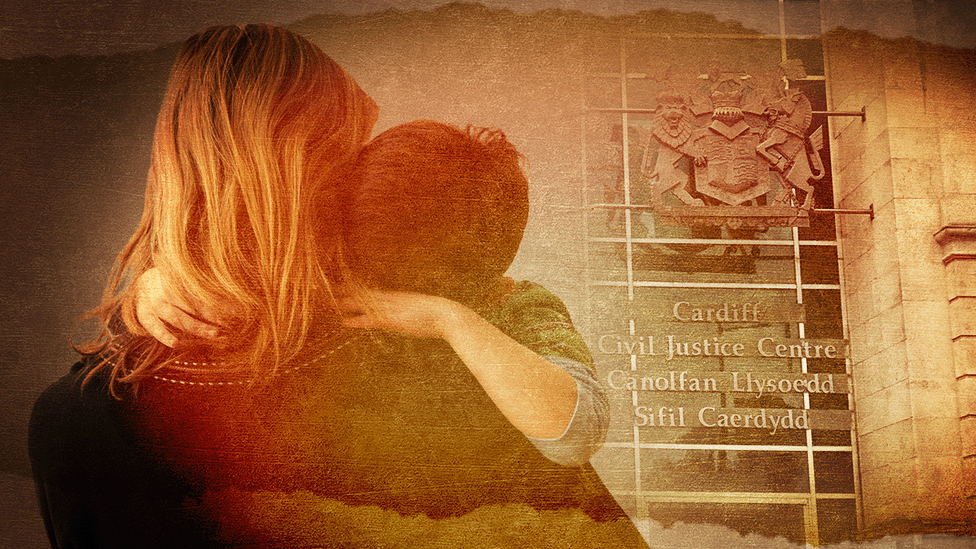Paedophiles could be stripped of parental rights under new law
- Published

Paedophiles convicted of serious sexual offences could lose parental rights over their children under a new law.
The proposed law change comes after the BBC reported the case of a mother who spent £30,000 in legal fees to stop her paedophile ex-husband getting access to their daughter.
After hearing the story, Labour MP Harriet Harman tabled an amendment to upcoming legislation.
It covers the most serious sexual offence - rape of a child under 13.
Speaking to BBC News, Ms Harman said paedophiles who were guilty of that crime in the future would be "automatically deprived" of their parental rights.
"He will be able to get them back only if he goes to the family courts and is able to persuade them that it is in the child's best interests that his parental rights are restored," she added. "In the case of a child rapist that is unlikely."
The BBC understands the Lord Chancellor - who is responsible for courts, prisons, probation and constitutional affairs - has agreed to the amendment.
"It's a glaring anomaly that while the law protects other people's children from a sex offender, it doesn't protect his own," Ms Harman told BBC Radio 4's Today programme.
She said current laws include a "carve-out" that protects a father's rights over his children, even if he is a convicted paedophile.
"That's obviously wrong, because it's the rights of the child that should be at the forefront, not the rights of the father," she said.
'Opportunity for change'
Ms Harman, a former deputy leader of the Labour Party, said she proposed the change after hearing the story of Bethan on the Today programme.
She said the story highlighted the "glaring anomaly" that left a convicted paedophile's parental rights intact, and often forced women like Bethan into long and expensive legal battles to protect their children.
She described this as "part of the hangover of the patriarchy".
Ms Harman said the courts and the law should "step forward to protect children" instead of "leaving it to the mother".
"[I] knew that because the government had legislation going through parliament, there was an opportunity for change, so I tabled a new clause to change the law," she said.
Bethan's ex-husband was barred from contact with all children except his own after he had been found guilty of serious paedophile offences.
Yet even in prison he retained rights over his daughter's education, health and travel, causing problems when Bethan planned a holiday abroad.
Last November, Cardiff Family Court ruled in Bethan's favour and restricted the father's rights. He is now forbidden from any contact with his daughter until she turns 18. "It's changed our lives," Bethan told the BBC. "It's such a relief."
More reporting from family courts
She was not in court for her ex-husband's trial and so did not know exactly what he had done until she paid for transcripts of the hearing. She said she was relieved other parents would not have to go through what she did.
"Not every mother has the time to track cases through court," she said.
Bethan's Cardiff Family Court case was relatively straightforward, but nonetheless cost £30,000 in legal fees. Her parents extended their mortgage to help fund the case.
The new legislation would mean parents like Bethan will no longer have to pay thousands in legal fees to ensure their children are safe.
Children would be protected from the moment a parent is convicted in a criminal court. Bethan told the BBC it was "a tremendous victory".
"In the cost of living crisis, people have struggled to feed and clothe their children," she said. How can they afford to go to court as well? Can you imagine that? Being priced out of safeguarding your own child."
Bethan and her parents believe their experience shows the value of reporting proceedings in the family courts.
Coverage of her case was permitted through the Transparency Pilot, which allows journalists to report family courts in a meaningful way for the first time. This pilot has been extended to cover almost half the family courts in England and Wales.
This story uses a false name to protect Bethan's privacy.
If you've been affected by issues raised in this story, there is information and support available on BBC Action Line.
- Published20 November 2023
